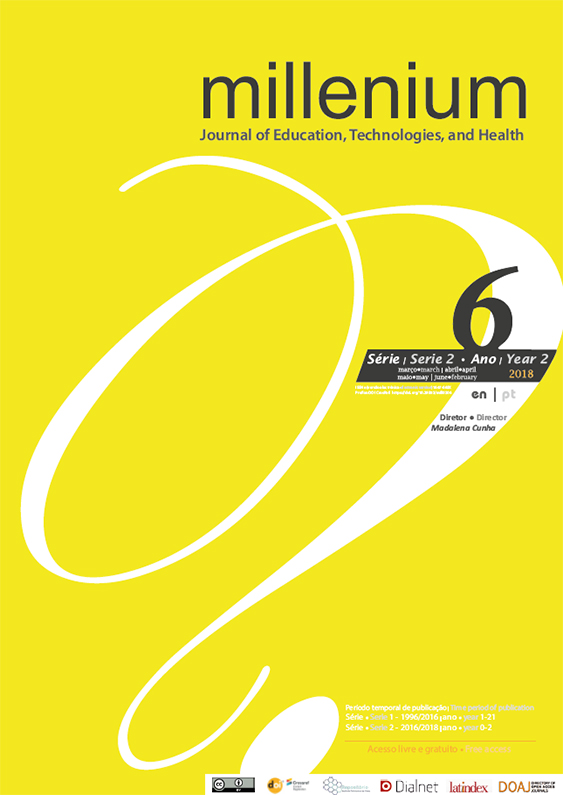Curricular articulation between early childhood education and primary school: conceptions and practices
DOI:
https://doi.org/10.29352/mill0206.07.00161Keywords:
Curricular articulation, Early childhood education, Primary school, Educational continuityAbstract
Introduction: Curricular articulation between early childhood education and primary school is a fundamental process concerning the child’s adaptation to school. Primary teachers should establish links with pre-school educators, facilitating the transition between these two levels of education in a harmonious process, and promoting the continuity of the educational process.
Objectives: To ascertain the importance and the meaning that teachers of primary school confer to curricular articulation and to know the aspects of the profile of the pupils that are favoured when consulting the individual process, as well as the most frequent initiatives regarding that articulation.
Methods: A descriptive and analytical research was conducted, using a questionnaire survey applied to a sample of 45 teachers of the 1st year of primary school in the municipality of Viseu (Portugal).
Results: From the data obtained, it is worth mentioning the great importance that teachers attribute to curricular articulation, the privilege conferred by them on how to behave in society (citizenship), the sense of autonomy and the children’s ability to communicate, as well as the teachers’ commitment to carry out a variety of activities and projects, in addition to the celebrations of thematic days and parties.
Conclusions: Curricular articulation facilitates the transition between these two levels of education and contributes to an adequate adaptation of the children to the school, thereby promoting school success for all pupils.
Downloads
References
Aniceto, J. (2010). Articulação curricular pré-escolar/1.º ciclo do ensino básico: Práticas colaborativas (Dissertação de Mestrado). Universidade de Aveiro, Aveiro. Retrieved from https://ria.ua.pt/bitstream/10773/1428/1/2010001099.pdf
Barbosa, E. (2010). Articulação curricular e (in)sucesso educativo na disciplina de inglês: Um estudo exploratório (Dissertação de Mestrado). Universidade do Minho, Braga. Retrieved from http://repositorium.sdum.uminho.pt/bitstream/1822/14582/1/tese.pdf
Bardin, L. (2015). Análise de conteúdo. Lisboa: Edições 70.
Bravo, M. (2010). Do pré-escolar ao 1.º ciclo do ensino básico: Construindo práticas de articulação curricular (Dissertação de Mestrado). Minho: Universidade do Minho, Braga. Retrieved from http://repositorium.sdum.uminho.pt/bitstream/1822/13764/1/Margarida%20Maria%20Guimar%C3%A3es%20Freitas%20Bravo.pdf
Bronfenbrenner, U. (1979). The ecology of human development: Experiments by nature and design. Massachusetts: Harvard University Press.
Carvalho, A. (2010). Articulação curricular pré-escolar/1.º ciclo do ensino básico: Contributos para o sucesso educativo (Dissertação de Mestrado). Aveiro. Universidade de Aveiro, Aveiro. Retrieved from https://ria.ua.pt/bitstream/10773/4017/1/4725.pdf
Cruz, M. (2008). Articulação curricular entre a EB1 e o Jardim de Infância: Práticas docentes (Dissertação de Mestrado). Universidade de Aveiro, Aveiro. Retrieved from https://ria.ua.pt/bitstream/10773/1029/1/2009001015.pdf
Decreto-Lei n.º 6/2001, de 18 de janeiro. Diário da República n.º 15/2001, Série I-A de 2001-01-18
Decreto-Lei n.º 75/2008, de 22 de abril. Diário da República n.º 79/2008, Série I de 2008-04-22
Direção Geral de Inovação e Desenvolvimento Curricular (2007). Gestão do currículo na educação pré-escolar: Contributos para a sua operacionalização. Lisboa: DGIDC.
Fabian, H., & Dunlop, A.-W. (2006). Outcomes of good practice in transition processes for children entering primary school. Education for All Gobal Monitoring Report. Paris: UNESCO.
Fortin, J. (2003). O processo de investigação: Da conceção à realização (3.ª ed.). Loures: Décarie Éditeur, Lusociência.
Freixo, M. J. (2011). Metodologia científica: Fundamentos, métodos e técnicas (3.ª ed). Lisboa: Instituto Piaget.
Ghiglione, R., & Matalon, B. (2001). O inquérito: Teoria e prática (4.ª ed.). Oeiras: Celta Editora.
Hill, M. M., & Hill, A. (2005). Investigação por questionário (2.ª ed.). Lisboa: Edições Sílabo.
Lage, J. M. (2010). Educador/professor: Do pensamento à acção (Relatório Final de Mestrado). Universidade de Trás-os-Montes e Alto Douro, Vila Real. Retrieved from https://repositorio.utad.pt/bitstream/10348/519/1/msc_jmplage.pdf
Lei n.º 46/86, de 14 de outubro. Lei de Bases do Sistema Educativo – estabelece o quadro geral do sistema educativo.
Margetts, K. (2002). Transition to school: Complexity and diversity. European Early Childhood Education Research Journal, 10(2), 103-114. doi: 10.1080/13502930285208981
McMillan, J. H., & Schumacher, S. (2010). Research in education: Evidence-based inquiry (7th ed.). New Jersey: Pearson Education.
Ministério da Educação (2016). Orientações curriculares para a educação pré-escolar. Lisboa: Departamento da Educação Básica - Ministério da Educação.
Nabuco, M., & Lobo, M. (1997). Articulação curricular entre o jardim de infância e o 1.º ciclo do ensino básico. Saber (e) Educar, 2, 31-42.
Pires, E. L. (1987). Lei de Bases do Sistema Educativo: Apresentação e comentários (2.ª ed.). Porto: Edições ASA.
Portugal, G., & Laevers, F. (2010). Avaliação em educação pré-escolar: Sistemas de acompanhamento das crianças. Porto: Porto Editora.
Serra, C. (2004). Currículo na educação pré-escolar e articulação curricular com o 1.º ciclo do ensino básico. Porto: Porto Editora.
Teixeira, L. M., & Cardoso, A. P. (2013). Curricular articulation between pre-school education and the first cycle of basic education: Relevance and practical implications. In J. Morgado, M. Alves, I. Viana, C. Ferreira, F. Seabra, N. van Hattum-Janssen, & J. Pacheco (Eds), Future Directions: Uncertainty and Possibility – Proceedings of ECCS - European Conference on Curriculum Studies (pp. 490-494). Braga. ISBN: 978-989-8525-25-3
UNICEF (2012). School readiness and transitions. New York: UNICEF.
Downloads
Published
How to Cite
Issue
Section
License
Authors who submit proposals for this journal agree to the following terms:
a) Articles are published under the Licença Creative Commons (CC BY 4.0), in full open-access, without any cost or fees of any kind to the author or the reader;
b) The authors retain copyright and grant the journal right of first publication, allowing the free sharing of work, provided it is correctly attributed the authorship and initial publication in this journal;
c) The authors are permitted to take on additional contracts separately for non-exclusive distribution of the version of the work published in this journal (eg, post it to an institutional repository or as a book), with an acknowledgment of its initial publication in this journal;
d) Authors are permitted and encouraged to publish and distribute their work online (eg, in institutional repositories or on their website) as it can lead to productive exchanges, as well as increase the impact and citation of published work
Documents required for submission
Article template (Editable format)





